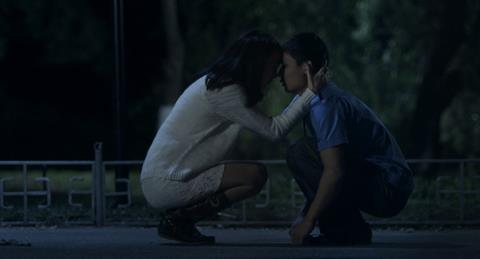Dir/scr: Nariman Turebayev. Kazakhstan-France. 2012. 78mins

Though the temptation to adapt Dostoyevsky’s White Nights to the screen is perfectly understandable, following in the steps of such masters as Luchino Visconti (White Nights) and Robert Bresson (Four Nights Of A Dreamer) is a far from an easy task.
Directed in an excessively slow, contemplative mood, its long speechless sequences are spiced with ironic insights into the life of modern Almaty.
Obviously inspired by his countryman, Darezhan Omribaev, whose Student attempted to tackle one of Dostoyevsky’s major novels, Crime and Punishment, as couple of years ago, Nariman Turebayev should have been equally warned by the less than happy results of that experiment. True enough, White Nights is only a short story, but a daunting challenge nevertheless, which Turebayev sadly doesn’t quite measure up to.
A minimalist approach that some Kazakh filmmakers seem to be particularly fond of combined with a casting that flattens the characters to a great extent will limit the interest of Adventure (Priklyuchenie), which moves Dostoyevsky’s heroes from St. Petersburg to the streets of Almaty.
Dostoyevsky’s encounter between a hopeless loner and a passionately enamored young woman who has been waiting for a year to see her lover return to her, was, in many respects, the epitome of a romantic affair – the meeting between an utterly solitary man sinking into the despair of his own solitude and an innocent girl who believes in the kind of perfect love one meets only in dreams or books, and prefers it to anything she can find in real life.
In Turbayev’s version, all innocence is bestowed upon the male character, Marat (Azamat Nigmanov), a lonesome young night watchman in an office building, who notices a young girl (Aynur Niyazova) waiting, in the middle of the night, under a lamp post, across the street from his work. When she is attacked by a lascivious drunk he jumps to her help, and once the aggressor runs off, offers her tea and then accompanies home. Next day he learns her name is Maryam, rings at her door, is let in and told the story of the ideal man who had introduced her to French literature and with whom she had embarked on a perfectly chaste romance, until he was offered a better job elsewhere. But he had pledged to come back and pick her up, one year later, under the lamppost where Marat first discovered her.
In the following four nights, Maryam does her best to distract naïve Marat from his job and take him on hikes around town that indicate she is an incurable tease, a constant danger to men in her life. But smitten with her charms, he still proposes marriage. A happy, but quite unnecessary, ending is provided outside the Dostoyevsky context by a narrator who assures the audience that no real harm was done to the protagonist.
Directed in an excessively slow, contemplative mood, its long speechless sequences are spiced with ironic insights into the life of modern Almaty, the loquacious monologues of a female bartender always seen from the back offering some of the film’s more felicitous moments.
Turebayev slips in a suggestion that Maryam may not be real but just a figment of Marat’s imagination and that this may explain the faint traces of emotions registered on Nigmanov’s features all through the film or the flighty, restless performance of Niyazova, whose Maryam would have never had the patience to wait, even one day, for a single man when there are so many others around. No wonder a relationship between them seems too unlikely to take seriously.
Production companies: Kazakhfilm, Arizona Productions
Sales contact: Pascale Ramonda, pascale@pascaleramonda.com
Producers: Anne Katchko, Guillaume de Seille
Cinematography: Kabek Amerzhanov
Editor: Aybol Kasymzhanov
Production designer: Munir Akhmetzhanov
Music: Irena Scalerika
Main cast: Azamat Nigmanov, Aynur Niyazova





















